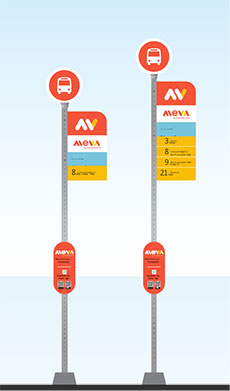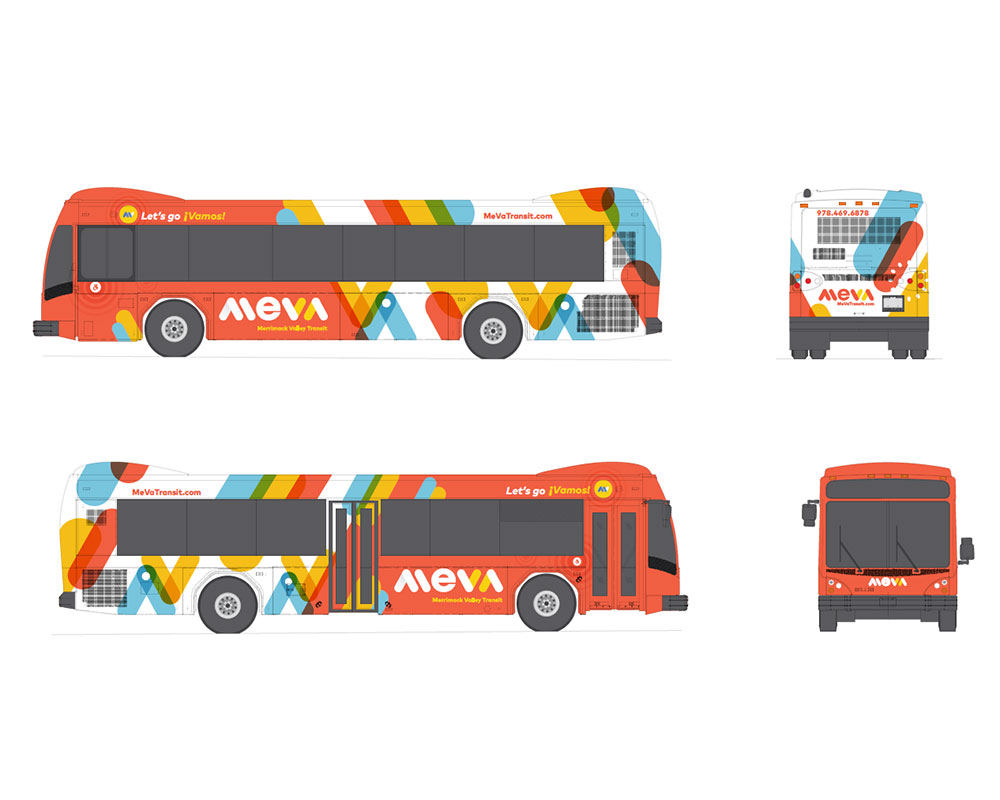
Bus stop signage with the new MeVa name.
Upon his arrival last year, the new administrator of the Merrimack Valley Regional Transit Authority pledged to improve the visibility of the public bus company and make it easier for potential riders to try the service.
Administrator Noah S. Berger is able to cross a few things off his to-do list with the Massachusetts Department of Transportation formally awarding money Tuesday for conspicuous bus shelters, signs and other amenities. Berger told WHAV Tuesday, the Transit Authority is partnering with Lawrence, Amesbury, Methuen and Haverhill to help “fulfil our vision for a more visible, welcoming and customer-oriented transit system.”
Berger said the rollout will be accompanied by a new name and look. After nearly 50 years, the Merrimack Valley Regional Transit Authority becomes “MeVa,” short for Merrimack Valley.
“MeVa Transit is spiffier, easier to say and we believe more inviting,” Berger told WHAV.
In an interview with WHAV last summer, Berger noted bus service must move from riders flagging down buses to more formal bus stops. While many existing riders are familiar with the system, he said at the time, it may be “intimidating” for others who do not know where to stand or which bus and when it drives by.
“One thing that stands out is that we have tended to fly under the radar screen, so we’re not as visible as maybe we need to be,” he explained.
Shelters feature glass designs, similar to the one installed last year on River Street in Haverhill near Westgate Center.
The Transit Authority took the lead in a grant for $399,312 for the installation of 14 bus shelters in Lawrence and four in Amesbury. It was a supporting partner under the lead of the City of Methuen’s $392,660 project to make lower Broadway more pedestrian friendly, including installation of three new shelters and benches and Haverhill’s partner for a $50,000 project to demonstrate new “smart bench technology” and infrastructure at bus stops.
According to the state, the Haverhill project also includes WiFi hotspots and video screens for bus stops serving public housing. The Methuen plan also adds crosswalks, pedestrian signage and wayfinding, curb extensions and benches, along a little more than half mile stretch of Lower Broadway.
Among his top priorities, Berger told WHAV last year, is bringing back riders in the aftermath of COVID-19. “Our ridership is far below what it had been before COVID. I think there’s a need, not only to get our old riders back onto the service, but identify new riders and get them onto our service,” he said.
Transit Authority board members voted unanimously last December to a two-year pilot program of free buses on all local fixed route and EZ Trans paratransit services. Fares are still collected on the Boston Commuter bus. Lost fares were replaced with federal money from the Coronavirus Aid, Relief and Economic Security Act and American Rescue Plan Act.
The Shared Streets and Spaces program provides grants as small as $5,000 and as large as $500,000 for communities and transit authorities to make changes to their streets that allow for safer walking, biking, public transit, recreation, commerce and civic activities. Improvements can be intentionally temporary or permanent.
In addition to the bus station improvements, Haverhill received $47,467 for speed feedback and messaging signs, while Amesbury was granted $200,000to add a bike lane from Whittier Bridge to Merrimac Street.

